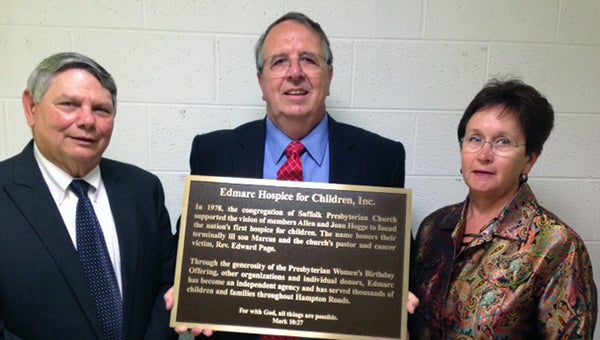Church dedicates Edmarc plaque
Published 10:29 pm Saturday, June 7, 2014

From left, Don White, Bruce Sharp and Nancy King, all current or former board members at Edmarc Hospice for Children, show a plaque that will be dedicated today at Suffolk Presbyterian Church recognizing the church’s founding role in Edmarc. (Submitted Photo)
In 1978, the suffering of one family losing a child and the compassion of the church that surrounded them with love blossomed into the nation’s first hospice for children.
Today, Suffolk Presbyterian Church will dedicate a plaque recognizing its founding role in Edmarc Hospice for Children, which has assisted hundreds of families confronting unimaginable loss in the years since.
“If it hadn’t been for Suffolk Presbyterian Church, I don’t think Edmarc would have started,” said Joan Hogge.
In 1980, Joan and her husband, Dr. Allen Hogge, lost their son Marcus, 7, to a progressive neuromuscular disorder. When their family was going through Marcus’ illness, there was no place nearby that could care for him or even offer respite care so the Hogges could spend time alone or with their two daughters.
“Not just anybody could come into the home and babysit because of the serious nature of his illness,” said Don White, a past board chairman for Edmarc.
The church rallied around the family, helping in any way it could. But it wasn’t long until everyone realized something important — the Hogges were not the only family in Hampton Roads grappling with a child’s terminal illness.
The Rev. Ed Page, pastor of the church at the time, helped get a grant from the Presbyterian Women, which paid for a needs assessment.
“We found there was a large need,” said Bruce Sharp, who was on the original steering committee and first board of directors.
At first, the fledgling organization had offices at Suffolk Presbyterian Church and offered trained volunteers for respite care. It also assisted families with children who had developmental delays, but that was soon determined to be too broad a focus.
“We found we couldn’t do both,” said Nancy King, a current board member. “The Children’s Center branched off,” and now has become an eight-location center providing early intervention and Head Start programs.
Rev. Page, who had cancer, died in 1979 at the age of 29. After Marcus’s death, their first names were combined to give the new hospice its name.
For a time, the organization still continued to operate out of the church and operate more as a daycare than as a hospice.
“When we started to be able to get some doctors and nurses and physicians of all types and other people, social workers and ministers and so forth, then we were able to go out and start trying to bring in some children,” said Al Nash, a member of the original steering committee and the first board of directors. “We found there was just a world of young people that needed help, and their parents needed it.”
At the time, the concept of a hospice for children was unheard of, some of the initial board members said.
“It was a concept nobody had ever thought of before,” Sharp said. “We had a little bit of trouble with that.”
But eventually the medical community — both locally and nationwide — caught on. Edmarc has been used as a model for other children’s hospices across the country, White said.
The organization’s work finally outgrew the space the church had to give. It operated in Chesapeake for a while before it obtained the home where it currently operates, on London Street in Portsmouth.
“The board realized the center of need was more in the Portsmouth/Chesapeake/Norfolk/Virginia Beach area,” King said. “It left the church physically, but it never left the church emotionally.”
These days, Edmarc and its 15 employees serve about 70 children in the clinical program and provide bereavement support to 164 families. The organization also runs an outreach bereavement program for children and teens who have lost anyone significant to them, whether or not the family was served by Edmarc.
“I wish I could say the doors could be locked and Edmarc would never be needed again,” said Debbie Stitzer-Brame, the executive director of Edmarc. “We’ve been around for 35 years, and I think we’ll be around until we can wipe out childhood illnesses and diseases.”
Stitzer-Brame said support from the church remains steadfast. Edmarc’s bylaws stipulate that at least one member of the board of directors will be a member of Suffolk Presbyterian Church. The church also provides financial, volunteer and other support.
“Suffolk Presbyterian was a small but mighty church,” Stitzer-Brame said. “Knowing that tie is there gives us great strength and support knowing we can do this tough work.”
And the church’s support in their time of need still means the world to the Hogges.
“We have a very special sense of gratitude to that particular church,” Allen Hogge said. “It was certainly a church that saw a need and acted on that need for the community.”




